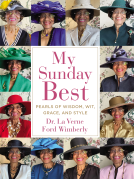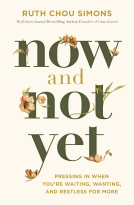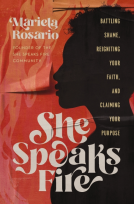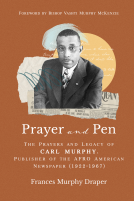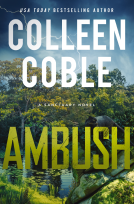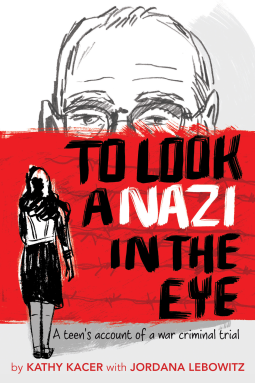
To Look a Nazi in the Eye
A Teen's Account of a War Criminal Trial
by Kathy Kacer; Jordana Lebowitz
This title was previously available on NetGalley and is now archived.
Send NetGalley books directly to your Kindle or Kindle app
1
To read on a Kindle or Kindle app, please add kindle@netgalley.com as an approved email address to receive files in your Amazon account. Click here for step-by-step instructions.
2
Also find your Kindle email address within your Amazon account, and enter it here.
Pub Date Sep 12 2017 | Archive Date Aug 16 2017
Description
A Note From the Publisher
Jordana Lebowitz attended the trial of Oskar Groening in 2015. She is dedicated to Holocaust remembrance and set up a Nazi cattle car exhibit at her university that was seen by more than 2000 people. From Toronto, she has worked for Holocaust organizations in Australia and California and travels frequently.
Marketing Plan
**Kathy Kacer will be signing a limited number of ARCs of To Look A Nazi in the Eye at ALA Annual in Chicago! Visit Second Story/Orca Books Booth #2629 on Friday, June 23rd at 5:30PM.**
**Kathy Kacer will be signing a limited number of ARCs of To Look A Nazi in the Eye at ALA Annual in Chicago! Visit Second Story/Orca Books Booth #2629 on Friday, June 23rd at 5:30PM.**
Available Editions
| EDITION | Other Format |
| ISBN | 9781772600407 |
| PRICE | $13.95 (USD) |
Links
Featured Reviews
This book follows the trial of Oskar Groening, known more commonly as the Bookkeeper of Auschwitz. As a transcript of the event was never formally recorded and published, this book is a reconstruction of various witness accounts, testimonies and published documents. It is told via Jordana Lebowitz's journey as she becomes determined to attend the trial to witness it firsthand - you may know of her blog detailing the events for the Simon Wiesenthal Center.
This book made me want to stop reading and start doing something - this is both inspirational but heartbreaking all in one. There are a number of elements of this book which I particularly liked. Most of all the witness statements and reconstructed testimony of Groening's. These really hit home, were ugly and descriptive but absolutely set the scene for me.
Jordana has conflicting emotions about the man she expected to come out looking evil, but who in fact appeared quite ordinary, old and frail. I liked that the authors conveyed that not all evil has a certain look about it. But I liked even more so that they captured how a newer generation of Germans have also been affected by the events of their ancestors. It certainly blows out any ignorant perspectives, and general tarring with the same brush ideas that I'm sure are not entirely lost in today's society. In fact, the authors wonderfully weave in the possibility for parallels between this time and modern society which sadly are still evident. Equally, they did not shy away from questioning if condemning a man for a crime so long ago was really justice, if it had any purpose or was fair particularly as he did not directly murder anyone. The controversy of many of the points really captivated me and kept the pages turning.
The layout of the book is perhaps slightly unusual because it isn't a firsthand account but isn't entirely reconstructed - I imagine reading Jordana's blog alone would have been substantial in evoking an emotional, thoughtful response from the general public. But I'm not sure it would reach an audience like me - a younger reader with less knowledge of this time who might want to expose themselves to more information, but not necessarily want to wade through formal textbooks to do so. And that's why I found this book to resonate so powerfully with me; because it was accessible, written in a way I could connect with, despite my knowledge being less in depth about this time than others (although I did recognise the stories from Eva Mozes Kor from previous books I've read), and I, very much like Jordana I suppose, want to know more about those who did suffer through that time to spread their message. For me, this book is important for future generations and I absolutely think it has a place in schools at the very least so that others might experience this part of history, but from the fortunate safety of the pages of a book.
The message is loud in this book. You will not find it beautiful or delicate. It is harsh and ugly. But maybe books like this are the stepping stones to making sure that our world doesn't ever become so dark again. The bravery of the survivors to tell their story, to seek justice and in some cases, to forgive the monsters of their memories, will absolutely stay with me. And I also learnt a thing or two as well. I wouldn't hesitate to pass this book along.
An honest, real and emotional read. This book relates the days Jordana Lebowitz spent in Lüneburg for the trial of Oskar Gröning, a former SS. During this trial, Gröning acknowledges that what happened in Auschwitz was terrible, but declares he had nothing to do with Jewish people being killed. He was just a cog in the machine. Inherent obedience shines through when in presence of an authority and his actions proved it but that still didn't mean that he wasn't to blame as it is said, “If you think of the ‘death machine’ then all the parts of the machine must work. Otherwise the machine does not work.” and “In other words, Herr Gröning, you facilitated the smooth operation of Auschwitz’s killing machine by your actions.”
This book provided an insight into the lives of future generations of the holocaust survivors and it was equal parts haunting and interesting. Thoroughly enjoyed reading this!
 Nicole C, Reviewer
Nicole C, Reviewer
This is a true story of Jordana Lebowitz' experience as a teenager. Being the granddaughter of a Nazi victim, she was able to stand trial against a bookkeeper of Auschwitz. This is her account in her own words with help by coauthor Kathy Kacer. Great for WWII history lovers!






